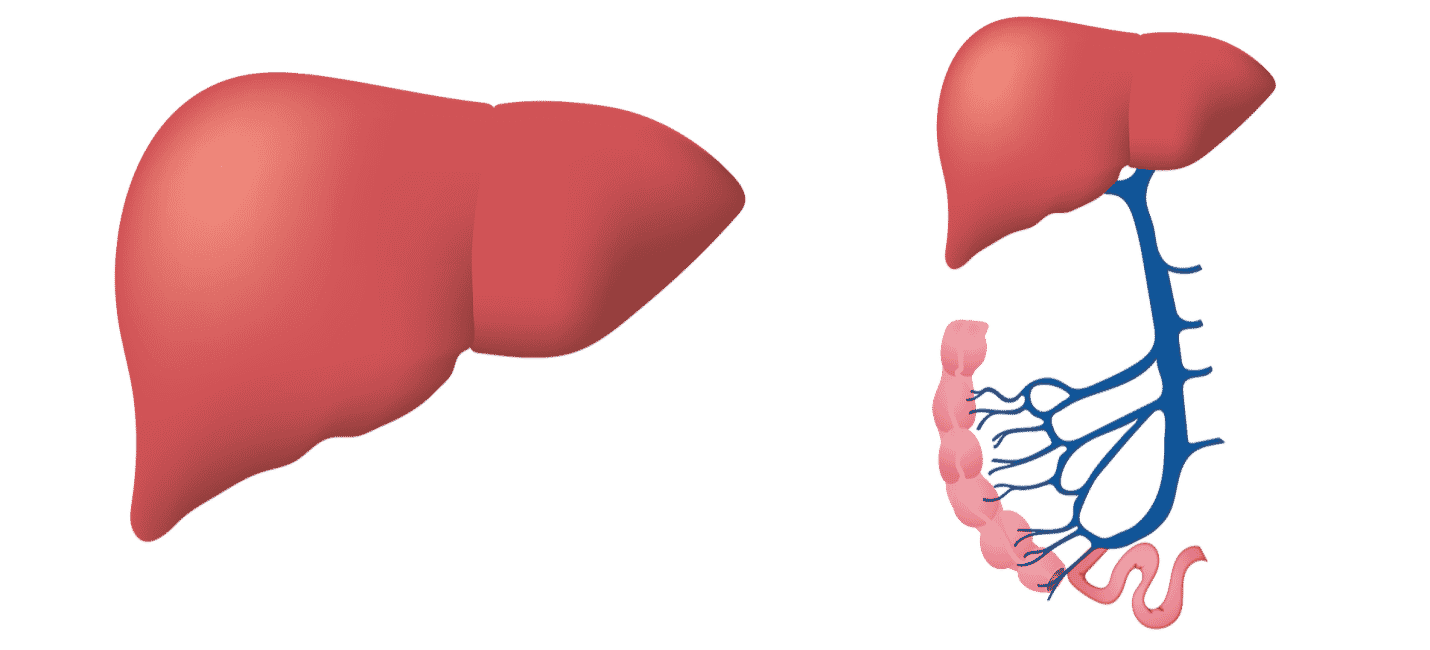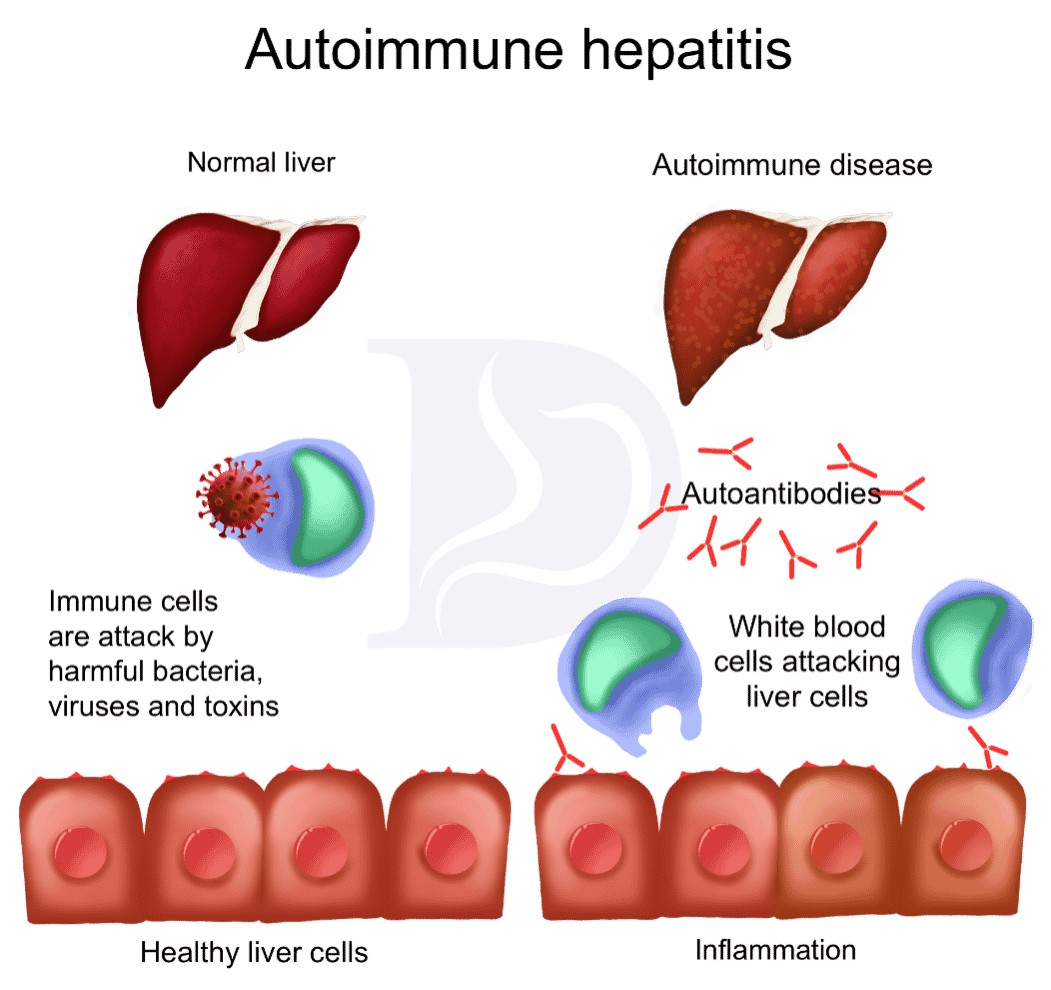The liver is a large organ located on the right side of the abdomen just below the diaphragm. It performs various vital functions to maintain life, such as:
- Storage of excess carbohydrates in the form of glycogen.
- Storage of several vitamins and minerals.
- Synthesizes proteins and blood clotting factors.
- Detoxifies harmful drugs and makes them soluble.
- Synthesizes and secretes bile which helps in the digestion of fats.

Good liver function is vital to overall health. The liver has excellent regenerative capacity as well. Unfortunately, certain diseases can cause chronic liver damage and compromise its functions. Hepatitis is one such disease.
Hepatitis:
Hepatitis is an inflammatory disease of the liver that results in liver fibrosis and can progress to liver failure. Just like bruising of the skin can cause pockets of fluid accumulation and swelling, damage to the liver can do the same.
When liver cells are damaged, they can swell and become inflamed. This is essentially defined as hepatitis. The most common cause of hepatitis is a viral infection. However, it can also be caused by certain medicines, alcohol, poisons and other diseases.
The immune system functions to protect the body against foreign pathogens.Hepatitis can be classified into acute and chronic forms. Acute hepatitis develops suddenly and typically lasts a short period of time. Chronic hepatitis can last for many years.
The liver does try its best to repair the damage caused by hepatitis. This process forms fibrous tissue in the damaged areas, like scar tissue that develops at wound sites on the skin. Unfortunately, liver fibrosis itself can lead to liver cirrhosis and liver failure.
Autoimmune Hepatitis:
Normally, the immune system doesn't harm its own body tissues. However, the immune response sometimes can be abnormal, and the immune system can become sensitized against its own organs and other tissues. As a result, antibodies are produced that damage the affected regions of the body in a condition known as autoimmunity. When antibodies develop against the liver and the immune system damages the liver, autoimmune hepatitis(2) occurs.

Symptoms of Autoimmune Hepatitis:
Autoimmune hepatitis is reported mainly in young females. However, it can also occur in older men and women.
Early disease symptoms include fatigue, joint pain and abdominal discomfort. As the disease progresses to liver cirrhosis, it causes jaundice, abdominal swelling due to ascites, mental confusion, intestinal bleeding, etc.
Diagnosis of Autoimmune Hepatitis:
The risk of developing autoimmune hepatitis is greater in patients suffering from other autoimmune conditions such as thyroiditis, diabetes mellitus, Sjogren's syndrome, vitiligo, ulcerative colitis etc.
Autoimmune hepatitis is diagnosed on the basis of autoantibodies present in the blood. Antinuclear antibodies and smooth muscle antibodies are the two types of antibodies present in the patient's blood. Gamma globulins are also found to be raised in this scenario(3).
Your provider may perform a liver biopsy to check the extent of inflammation and scarring. During this process, a sterile needle is used to extract a small piece of liver tissue under local anesthesia. Then the tissue is examined under a microscope to assess for fibrosis.
Treatment of Autoimmune Hepatitis:
Prednisone and Imuran are two medications commonly used in the early stages of autoimmune hepatitis.
The main goal of treatment is to suppress the immune system in order to avoid further antibody damage to the liver. If a patient is doing well, treatment can be stopped. However, the disease may reoccur in certain circumstances, requiring lifelong therapy(6).
Prednisone also has side effects such as fluid retention, weight gain, facial swelling and osteoporosis. The lowest possible dose is usually prescribed to help avoid undesirable side effects. If autoimmune hepatitis progresses to an advanced stage, the treatment of choice is a liver transplant.
The Bottom Line:
Autoimmune hepatitis is a chronic, autoimmune disease caused by autoantibodies against liver tissue. If left untreated, the disease can progress to liver cirrhosis and liver failure.
Early detection and treatment of autoimmune hepatitis can help to avoid progression to end stage liver disease. In the advanced stages of the disease, a liver transplant is typically required.
References
- Pixabay.com. Available from: https://pixabay.com/illustrations/liver-biology-medical-anatomy-3026639/
- Floreani A, Restrepo-Jiménez P, Secchi MF, De Martin S, Leung PSC, Krawitt E, et al. Etiopathogenesis of autoimmune hepatitis. J Autoimmun. 2018 Dec;95:133–43.
- Sucher E, Sucher R, Gradistanac T, Brandacher G, Schneeberger S, Berg T. Autoimmune Hepatitis-Immunologically Triggered Liver Pathogenesis-Diagnostic and Therapeutic Strategies. J Immunol Res. 2019;2019:9437043.
- Czaja AJ. Diagnosis and Management of Autoimmune Hepatitis: Current Status and Future Directions. Gut Liver. 2016 Mar;10(2):177–203.
- Komori A. Recent updates on the management of autoimmune hepatitis. Clin Mol Hepatol. 2021 Jan;27(1):58–69.

